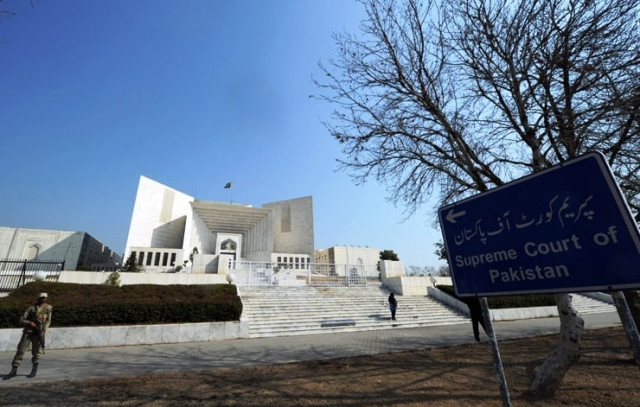‘Speedy and cheap justice’: When litigation costs less than a cup of tea
Interestingly, there is absolutely no official fee on instituting a criminal case.

Even knocking on the doors of the Supreme Court is not overly expensive. Under the fee act, a constitutional petition can be filed in the apex court by spending Rs200 each. However, a review plea costs around Rs15,000. PHOTO: AFP/FILE
The cost of filing a case – involving a variety of litigation from solemnising marriage to divorce, property ownership and intellectual rights – is less than what a cup of tea costs at the bistro.
Interestingly, criminal cases incur not a single penny.
Ironically, what still angers the majority of people who bring forth litigation in a court are the heavy fees charged by legal professionals coupled with the mandatory ‘mithai’ or ‘chae-pani’, says one lady, Shafquat Bibi.

The 40-year-old woman and her five sisters have had a bitter experience of spending hundreds of thousands of rupees during a 36-month long legal battle in court to seek their legal share in inherited property.
“The litigation has cost Rs600,000 besides consuming 36 months of running between one institution to the other. Chae-pani for the relevant staff is extra expense,” Shafquat told The Express Tribune.
As their case enters the final stage of getting physical possession of the suit property, the six sisters have already run short of money and energy.
“The three lawyers we hired have sucked all the money we could afford. Now, the fourth one has asked us to arrange Rs50,000 to get the property registered in our name,” she stated.
A glance at the law – Court Fees Act 1870 – under which the court fees are regulated shows how convenient its British authors have made it for the citizens to seek justice from the courts.

According to government-fixed fees rates, filing a case involving property or marriage disputes costs the petitioner Rs17 - Rs 15 for a plaint and Rs2 for an affidavit.
In the high court, a constitutional petition can be filed by paying Rs100 along with additional charges of Rs5 for a lawyer to file the power of attorney and Rs30 to file an affidavit. The review appeal costs half of what one pays for the original petition.
Even knocking on the doors of the Supreme Court is not overly expensive. Under the fee act, a constitutional petition can be filed in the apex court by spending Rs200 each. However, a review plea costs around Rs15,000.
Free criminal litigation
Interestingly, there is absolutely no official fee on instituting a criminal case right from the district courts and appealing to the high courts and the Supreme Court.

“The criminal cases are always filed against the state and not a private party or person. The logic behind recovering no fee in such cases is to put no burden on the suspects,” said senior lawyer Muhammad Farooq.
Family cases
The fee to file a case in the family courts is Rs17 each - Rs15 to file a lawsuit and Rs2 for filing power of attorney by the lawyer.
Although the country’s constitution gives the winning litigant the right to claim the cost incurred on the proceedings, this right is rarely exercised except in a few hundred cases in which people claim damages in case of financial or physical harms.
Professional fee regulation
Although the colonial era law is still helping millions pay less on instituting cases in the courts of law, many litigants complain that successive governments have failed to regulate fees charged by different professionals, including lawyers.
Karachi’s legal fraternity challenged in the Sindh High Court the imposition of six percent general sales tax imposed by the Sindh government in its annual budget announced in June.
Fruit(less) movement
Piles of cases – including those pending for two to three decades – grew in number during the two years of the legal fraternity’s historic movement aiming for supremacy of the constitution and independence of the judiciary.
Millions of litigants countrywide like Shafquat Bibi, who had suffered on account of frequent boycotts of legal proceedings and strikes at the courts by the protesting lawyers, were promised ‘speedy and cheap justice’ in return.
Eleven months after the judiciary gained its independence, with sacked judges back in courtrooms and the supremacy of the constitution restored, litigants still feel that cheap justice appears to be an elusive dream.
“We suffered a lot due to frequent boycotts of legal proceedings by the lawyers. Once back to business the lawyers have increased their professional fees manifold,” said Mathew Robert*, an elderly man who is among thousands of litigants sharing the same views.
The chiefs of the country’s top bodies that represent the legal fraternity opposed the idea of regulating professional fees. But, they also expressed dismay over the exorbitant fees their colleagues demand from litigants.
“It’s more an ethical issue than professional,” Vice Chairman Pakistan Bar Council Qalb-e-Hussain remarked. “The fees cannot be regulated because a junior lawyer charges less and a senior more according to his/her experience and competency.”
Free legal aid
Under the provisions of the Legal Practitioners Act 1976, each district bar association is bound to provide free legal aid to the deserving litigants.
In Karachi, the bar associations had strongly opposed the operations of non-government organisations engaged in providing free legal aid to the poor, needy prisoners and litigants at the subordinate courts as well as prisons.
According to the Sindh High Court Bar Association, its members are currently providing free legal assistance in some fifty cases in which the litigants cannot afford to hire a professional lawyer. This number is less than the number of cases fixed before one judge every day.
Many of the litigants like Shafquat Bibi say their legal battles have left them unable to afford a cup of tea at the bistro. *
* Name Has Been Changed To Protect Privacy
Published in The Express Tribune, August 9th, 2013.



















COMMENTS
Comments are moderated and generally will be posted if they are on-topic and not abusive.
For more information, please see our Comments FAQ